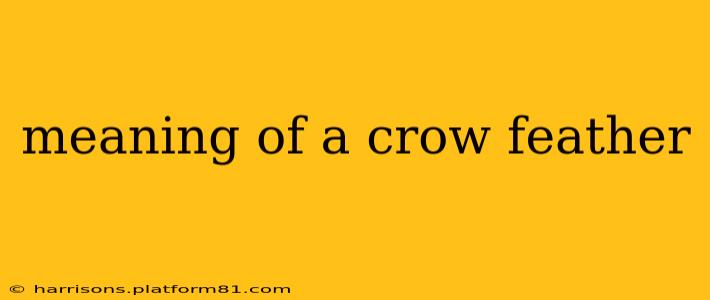Crow feathers, often overlooked in favor of brighter plumage, hold a surprising depth of meaning across various cultures and belief systems. Their symbolism isn't uniform, varying depending on context and interpretation, but they consistently represent powerful themes of transformation, intelligence, and the liminal space between worlds. This exploration dives into the multifaceted meanings associated with crow feathers, examining their significance in folklore, spirituality, and contemporary interpretations.
What does finding a crow feather mean?
Finding a crow feather is often considered a significant event, imbued with symbolic weight depending on individual beliefs and cultural background. Many interpret it as a message from the spirit world, a sign of change, or a reminder to pay attention to intuition. Some believe it signifies the presence of a crow spirit guide, offering protection and insight. The exact interpretation, however, is personal and subjective. It's less about a definitive meaning and more about the individual's connection to the feather and their own intuitive understanding.
What does a crow feather symbolize?
Crow feathers symbolize a complex array of attributes:
-
Intelligence and Cunning: Crows are known for their exceptional intelligence and problem-solving abilities. A crow feather can thus represent sharp wit, strategic thinking, and the ability to navigate complex situations.
-
Transformation and Change: Crows are often associated with transformation and change due to their presence at both the beginning and end of life cycles. Finding a crow feather might signal a period of significant personal transformation or a shift in perspective.
-
Mysticism and the Unseen: Crows have long been linked to the mystical and the unseen. Their association with shadow and darkness often leads to interpretations connecting crow feathers to intuition, psychic abilities, and communication with the spirit world.
-
Protection and Guidance: In some cultures, crows are considered powerful protectors. A crow feather might be interpreted as a sign of protection, guidance, or the presence of a spiritual guardian.
-
Balance and Duality: Crows embody the duality inherent in life – light and shadow, life and death. A crow feather can represent the acceptance of both aspects, promoting a balanced perspective.
What are the spiritual meanings of crow feathers?
The spiritual meaning of a crow feather is deeply personal and tied to individual belief systems. However, some common spiritual interpretations include:
-
Messenger from the Spirit World: Many believe a crow feather is a message from a deceased loved one, a spirit guide, or a higher power.
-
Intuition and Psychic Awareness: Crows are often associated with psychic abilities and intuition, making a crow feather a potential symbol of heightened awareness.
-
Connection to Ancestors: In some cultures, crows are seen as intermediaries between the living and the dead, connecting individuals to their ancestral heritage.
-
Manifestation and Creativity: Some believe crow feathers symbolize the manifestation of intentions and encourage creative pursuits.
Are crow feathers lucky?
Whether a crow feather is considered lucky depends entirely on personal belief and cultural perspective. In some cultures, crows are seen as omens of ill fortune, while others view them as powerful and protective spirits. Therefore, the luck associated with a crow feather is entirely subjective.
What to do if you find a crow feather?
If you find a crow feather, take a moment to reflect on its symbolism and what resonates with you personally. You might choose to:
-
Keep it as a reminder: Carry the feather with you as a reminder of your intentions or as a symbol of personal growth.
-
Use it in crafts or rituals: Incorporate the feather into creative projects or spiritual practices.
-
Give it a respectful burial: If you feel uncomfortable keeping it, give the feather a respectful burial as a sign of gratitude.
The meaning of a crow feather is not fixed; it’s an interpretation guided by individual intuition and cultural context. By understanding its diverse symbolism and respecting its origins, you can unlock its personal significance.
